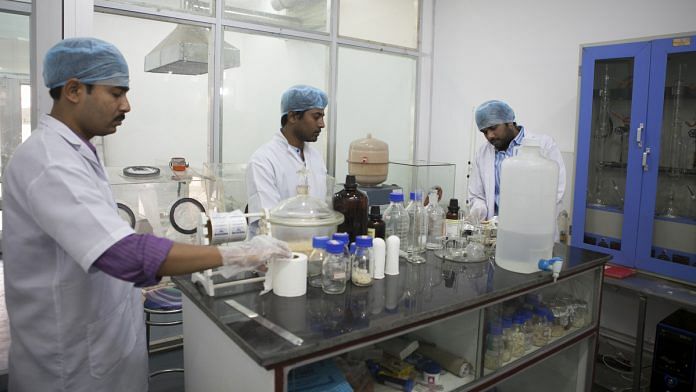Data by Elsevier, a top publisher of scientific articles and journals, places India in the fifth position for scientific research.
New Delhi: India is among the top 10 countries for scientific research, according to data released by Elsevier, a publisher of scientific articles and journals.
But the papers released by India are the least cited among these top countries, the data shows.
Elsevier’s latest Research Intelligence report, which was compiled earlier this year, places India in the fifth position for scientific research, while also noting that the country has shown a continuous rise in the past few years.
The report, accessed by ThePrint, lists the United States in the top spot, with China, Britain and Germany placed above India. Japan, France, Italy, Canada and Australia make up the top 10 in that order.
The report, Elsevier says, was finalised by collating data from institutions and speaking to academic experts. It is for the years between 2014 and 2017. The publisher maintains a database on research from across the world that is globally accepted. The Indian government uses it as one of the sources to calculate its research rankings.
The Elsevier report noted that even though the number of publications is high, the citation per publication for India is the least among the top 10 countries.
According to the Elsevier data, the number of citations per publication in India is 3. The report states that Britain and Australia have the highest number of citations at 6.1. They are followed by Canada at 6, Germany at 5.9, the US and Italy at 5.8, France at 5.6 and Japan and China at 4.1.
The number of citations per publication shows the number of times a research paper has been cited in another research. They indicate the quality of the research.
The Indian government, however, feels that this should not take away from the main findings.
“The average citation per paper of 3 is supposed to be very good. Only a few countries are above India in terms of research productivity,” a senior official at the Human Resource Development ministry told ThePrint. “In fact, this is quite credible for a young nation of 70 years. The good thing is it is rapidly increasing.”
Also read: Genetically modified Made-in-China babies raise a question — can it really work?
Research dominated by life sciences, engineering, medicine
Between 2014 and 2017, India produced 5,64,369 publications in various subjects, 16.7 per cent (about 94,249) of which were published in the top journals in the world, the Elsevier report said. There was international collaboration in 16.2 per cent of the total publications, it adds.
The most amount of research in this period was carried out in engineering (14.4 per cent), followed by medicine (10.6 per cent) and computer science (10.3 per cent), according to the Elsevier data. The least amount of research in this period was recorded in social sciences (close to 2 per cent), the report said.
IISc, Bengaluru, the IITs in Mumbai, Chennai, Kharagpur, Delhi, Roorkee and Kanpur and the University of Delhi are among the top institutes for research in India, according to the HRD Ministry.
Researchers take issue with metric used
Those working in the field, however, cautioned against reading too much into the report due to the metric used.
Aniket Sule, a scientist at the Mumbai-based Homi Bhabha Centre for Science Education, said that the bulk of the research from India isn’t up to the mark.
“Good research, which is happening at the Indian Institute of Science, the IISERs, IITs, central universities and other institutions, doesn’t form the majority of the research,” Sule said.
“The bulk of the papers are coming from state universities where teachers are publishing just for the sake of it, and 90 per cent of those papers are junk.”
Rahul Siddharthan, a computational biologist at the Chennai-based Institute of Mathematical Sciences, questioned the use of citations as a measure of quality.
“Research in India is a very complex subject. Using citations as a matrix is problematic because you have to consider many things like what was the reason behind the publication being cited,” Siddharthan said.
“Sometimes the research can be very good but not many people have cited it, sometimes the research could be bad but people are citing it because they want to correct it.”
Also read: Indo-French math whiz & ‘original’ economist among winners of Infosys science prize




Sir my name jyotsna i want to tell u about covid19 i want to talk about with scientist please call me once i well explain about antibiotic my no.9182278791 please call me once sir these is serious matter i want to discuss.
Quality of papers is important not quantities. So its does not mean india is hub of research. So stop rumers. India is far behind in research . Your govt decrease fund for research from 0.85 to 0.69 last 4 to 5 years. You govt. does not have enough fund to give fellowship / stiphend on time or increases from 4 years. They play dirty games in recent years with research institutes / research scholar s and interfere in research institutions.